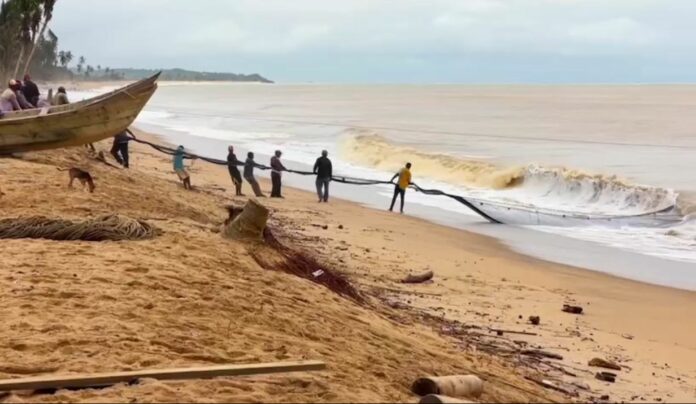As the world celebrates World Fisheries Day, we turn our attention to the struggling fishing community of Anlo Beach in the Shama District of Western Region.
Despite contributing 10% to the nation’s fishing sector, the industry is plagued by illicit activities.
The once-thriving Anlo Beach community now faces a gloomy future. Illegal mining in the Pra River has devastated fishing operations, imperiling the livelihoods of the fisherfolk.

The World Fisheries Day highlights the importance of sustainable fishing practices. Perhaps one community that needs urgent help with this is Anlo Beach, a fishing community in the Shama district as their livelihood is at stake.
Anlo Beach, once renowned for its stunning blue waters, has endured years of devastation from relentless tidal waves that have ravaged nearly half of the community and severe pollution from the Pra River.

Located at the estuary of the Pra river, the once-pristine sea which sustained the residents has transformed into a polluted expanse and even affected the nearby lagoons. It was about 10:52 AM when the news team arrived at Anlo Beach. George Ahiaku a fisherman tells us they cast their nets around 3:30 AM.

“The devastating impact of Pra River pollution from galamsey activities is being felt deeply in our community. The muddy waters flowing into the sea are driving fish into deeper waters, leaving us with severely depleted catches.”
He laments that the severe water pollution has rendered the estuary, once a breeding ground for various fish species, now uninhabitable.

“Due to water pollution, fish eggs are dying from chemical contamination. The chemicals used to extract gold upstream are harming fish reproduction, resulting in a significant decline in fish egg production.”
After an exhausting 7-hour fishing expedition from 3:30 AM to 10:52 AM, the team’s reward is a paltry catch, a stark testament to the struggles faced by the local fishing community.

“Our income has drastically decreased. Look at what we’ve caught today – just two baskets, and we’re more than 24 people. One basket sells for 300 cedis, so we’ll share 600 cedis among us. And that’s not even considering the net owner’s share, which hasn’t been deducted yet,” he lamented.
At the 2024 World Fisheries Day celebrations at Aboadze in the Shama district, President of the Canoe and Fishing Gear Owners Association of Ghana (CaFGAG) Nana Kwagya, disclosed that they had submitted recommendations to the Parliamentary Select Committee on Food, Agriculture, and Cocoa Affairs to amend the 2024 draft Fisheries and Aquaculture Bill.

A key proposal is to establish an Environmental Sustainability and Climate Change Division within the Ministry to solely focus on addressing ocean illegalities in safeguarding Ghana’s marine resources.
“We are deeply concerned about the devastating impact of illegal mining and harmful chemical practices on our oceans and their resources. To address these pressing environmental issues in the fisheries sector, we strongly propose the establishment of an Environmental Sustainability and Climate Change Division within the ministry.
This dedicated unit will focus solely on climate change and sustainability, ensuring the necessary attention is given to protect our oceans and fisheries.”
“These models demonstrate the effectiveness of dedicated environmental units in addressing climate change and sustainability issues.”
“We believe that establishing this division is crucial for the long-term health of our oceans, fisheries, and communities. We urge the Ministry to take decisive action and make this vision a reality.” He reiterated
The Canoe and Fishing Gear owners Association of Ghana (CaFGAG) has taken a significant step towards promoting sustainable fishing practices by launching their Small-Scale Fisheries (SSF) Guidelines.
This move aligns with the global efforts to secure sustainable small-scale fisheries, as outlined in the Voluntary Guidelines for Securing Sustainable Small-Scale Fisheries (SSF Guidelines) adopted by the Food and Agriculture Organization (FAO) in 2014.
Meanwhile Deputy Western Regional Director for Fisheries Commission, Matilda Adakano revealed that Ghana’s artisanal fishing sector plays a vital role in the country’s economy and food security, employing around 10% of the population contributing a staggering 57% to the fishing industry. Adakano stresses the urgent need for action to protect coastal communities and the fishing industry.

“According to Ghana’s 2021 annual report, the fishing industry produced around 630,000 metric tons, with the inland sector contributing 23%, the marine sector 63%, and aquaculture 14%. The marine sector is further divided into three categories: industrial trawlers, semi-industrial vessels, and artisanal vessels. Notably, artisanal vessels comprise all cannons and account for 57% of the marine sector’s contribution to the economy, while industrial trawlers contribute 39% and inshore 4%.
Breakdown of Ghana’s Fishing Industry:
- Inland Sector 23% of total production
- Marine Sector 63% of total production
- Industrial Trawlers 39% of marine sector contribution
- Inshore 4% of marine sector contribution
- Artisanal Vessels (Cannons) 57% of marine sector contribution
- Aquaculture 14% of total production
The artisanal sector provides employment for approximately 10% of Ghana’s population, making it a vital component of the country’s economy.” She noted.
In a related development, Western Regional Minister Kwabena Okyere Darko-Mensah is urging fishermen and fishmongers to prioritize their insurance and pension schemes, acknowledging the challenges in getting them to participate.

This year’s world fisheries day is on the theme, “Upholding Small-Scale Fisheries (SSF) Guidelines: Investing in social protection for equitable development in the fisheries sector.”













